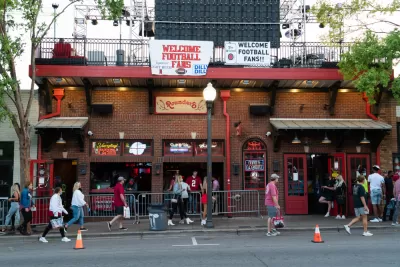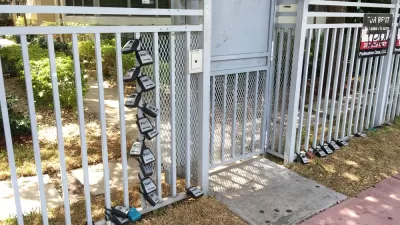Small college towns are seeing housing costs increase as out-of-town football fans buy up properties for short-term use.

"Gameday homes, investment properties where out-of-towners stay for football games and little else, are contributing to an increase in housing costs for permanent residents in Southern college towns like Starkville, according to a new study." As reported by Adina Solomon, the largely vacant units are driving up home prices in small towns without much surplus housing.
While short-term and vacation rentals are a contentious issue in many parts of the country, says Taylor Shelton, assistant professor of geosciences at Georgia State University and the study author, "based on the size, relative isolation of certain college towns in the South, and then the particular importance culturally of college football, that it’s in those places that this phenomenon is really the biggest deal." In Starkville, Mississippi–Shelton's case study–he estimates that 5 to 10 percent of housing units are gameday homes. "In some neighborhoods, more than 75 percent of housing units are used for just the six weekends a year when college football teams play home games."
The impact of gameday homes tends to be "concentrated in smaller cities, either without a large housing supply or nearby towns to absorb the demand for housing." Yet local officials haven't done much to address the problem. "[C]ities like collecting property taxes on gameday homes because they’re assessed at a higher value. The local government also needs to provide minimal services since owners don’t use a lot of water and electricity and don’t enroll their kids in the school district." According to Shelton, "[w]hat cities need to be focused on is how they can address the housing market concerns or the quality of life issues that arise from prime housing in the city sitting vacant the vast majority of the time and contributing nothing to the quality of life and experience of people who choose to make these places their home."
FULL STORY: Gameday Homes Increase Housing Prices in Southern College Towns

Alabama: Trump Terminates Settlements for Black Communities Harmed By Raw Sewage
Trump deemed the landmark civil rights agreement “illegal DEI and environmental justice policy.”

Planetizen Federal Action Tracker
A weekly monitor of how Trump’s orders and actions are impacting planners and planning in America.

The 120 Year Old Tiny Home Villages That Sheltered San Francisco’s Earthquake Refugees
More than a century ago, San Francisco mobilized to house thousands of residents displaced by the 1906 earthquake. Could their strategy offer a model for the present?

In Both Crashes and Crime, Public Transportation is Far Safer than Driving
Contrary to popular assumptions, public transportation has far lower crash and crime rates than automobile travel. For safer communities, improve and encourage transit travel.

Report: Zoning Reforms Should Complement Nashville’s Ambitious Transit Plan
Without reform, restrictive zoning codes will limit the impact of the city’s planned transit expansion and could exclude some of the residents who depend on transit the most.

Judge Orders Release of Frozen IRA, IIJA Funding
The decision is a victory for environmental groups who charged that freezing funds for critical infrastructure and disaster response programs caused “real and irreparable harm” to communities.
Urban Design for Planners 1: Software Tools
This six-course series explores essential urban design concepts using open source software and equips planners with the tools they need to participate fully in the urban design process.
Planning for Universal Design
Learn the tools for implementing Universal Design in planning regulations.
Clanton & Associates, Inc.
Jessamine County Fiscal Court
Institute for Housing and Urban Development Studies (IHS)
City of Grandview
Harvard GSD Executive Education
Toledo-Lucas County Plan Commissions
Salt Lake City
NYU Wagner Graduate School of Public Service





























